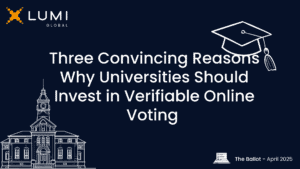We at Assembly Voting believe that online voting could be a game-changer and make democracy more inclusive than ever, namely by breaking down barriers to voting and enabling different social groups to more easily cast ballots. From those with mobility challenges to expats abroad, here are seven social groups which could benefit from online voting:
1. Citizens with Visual Impairments or Challenges with Mobility
Often, when citizens with visual impairments or challenges with mobility need to vote in person, they require assistance from another person to do so. Online voting can limit such issues and allow individuals with mobility challenges or disabilities to participate in the voting process more easily without compromising their autonomy or anonymity as a voter.
2. Elderly Citizens
While anything ‘digital’ or ‘online’ is commonly associated with young people, elderly and senior citizens could in fact stand to benefit from online voting. More specifically, online voting may be more accessible for elderly citizens who can face difficulties in traveling to polling stations or standing in long queues.
3. Military Personnel
Online voting can minimize issues related to distance and time zone differences, enabling them to actively participate in elections even while on assignments away from home. Regardless of where they are currently deployed or their schedules, military personnel can exercise their voting rights seamlessly through online platforms.
4. Remote Communities
By embracing online voting, remote communities far from population centers can overcome challenges presented by distance and exercise their democratic rights with ease. No matter how distant from cities they may be, residents of remote areas will no longer face the burden of lengthy journeys or reliance on scarce transportation services just to vote.
5. Citizens Living Abroad
By eliminating the requirement for a voter’s physical presence at a polling station, online voting empowers individuals living abroad to make their voices heard and contribute to the decisions in their home countries. It ensures that anyone living overseas can maintain their connections and actively participate in their home country’s elections no matter where they are.
6. Individuals with Busy Schedules
Whether it’s working professionals, dedicated parents, community volunteers, or ambitious young individuals, online voting offers time-limited individuals the chance to participate in the democratic process in a manner which suits them. An advantage of online voting is its flexibility, a property which can help individuals with busy schedules vote conveniently from any location with internet access.
7. Individuals with Language Barriers
Online voting systems can offer multiple language options and assistance tools, making the voting process more inclusive and accessible for individuals who may need ballots in different languages.
By reducing logistical barriers and making it more convenient to vote, online voting has the potential to increase overall voter turnout, something which can lead to more representative and inclusive democratic institutions.
If you would like to dive deeper and understand how online voting could help people with disabilities, read more here: https://assemblyvoting.com/blog/mobile-voting-systems-improve-accessibility/


